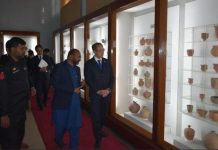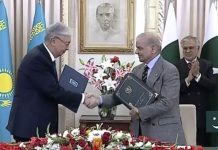Iqra Hanif
Geo-economic interests are strategic economic objectives that influence a country’s foreign policy and international relations, often related to economic growth, national security, and the promotion of national economic interests. Economic interests can include:Access to resources: Countries may seek access to natural resources to ensure a stable supply for domestic industries and economic growth.Market access: Governments strive to secure trade agreements and market access to promote exports, expand markets, and increase economic competitiveness.
Countries may seek foreign direct investment (FDI) to access new markets, technologies, resources, and skills, promote economic growth, and create job opportunities. Energy security: Countries must pursue diverse energy sources, develop energy infrastructure, and engage in energy diplomacy to reduce dependence on specific suppliers and mitigate energy-related risks. Infrastructure development: Building and upgrading infrastructure can improve trade, connectivity, and economic d
evelopment, and countries can invest in infrastructure projects to foster economic integration and influence. Financial influence: Countries may promote their currency as a reserve currency or establish financial institutions to extend their economic influence globally. They may also engage in economic cooperation, such as regional trade agreements or international financial aid, to strengthen economic ties with other nations. Intellectual property protection: Protecting intellectual property rights is essential for fostering innovation, attracting investment, and supporting technology-driven industries.
Countries may advocate for stronger protections to protect their economic interests. Geopolitical stability: Countries must maintain geopolitical stability in key regions to ensure uninterrupted trade flows, protect investments, and avoid disruptions that could negatively impact economic interests. Geo-economic interests are a country’s efforts to leverage its economic resources, trade relationships, investments, and infrastructure to improve its economic well-being, competitiveness, and national security. Pakistan has long recognized the importance of Central Asia in its geo-economic interests. The region is strategically located between Pakistan, China, Russia, and Afghanistan and is rich in natural resources. It is seen as a gateway to major markets such as Europe, the Middle East, and South Asia. Pakistan’s geo-economic interests in Central Asia can be understood through various dimensions:
Trade and Connectivity: Pakistan aims to improve trade and connectivity with Central Asia to diversify its trade routes and reduce dependence on traditional routes. It has been a proponent of the Central Asia Regional Economic Cooperation (CAREC) program, which focuses on improving regional connectivity, energy trade, and infrastructure development. Energy Cooperation: Pakistan seeks to engage in energy cooperation with Central Asian countries to meet its growing energy demands and reduce dependence on traditional energy sources. Projects like the Turkmenistan-Afghanistan-Pakistan-India (TAPI) gas pipeline aim to transport natural gas from Turkmenistan through Afghanistan and Pakistan to India, demonstrating Pakistan’s interest in accessing Central Asian energy resources.
Economic Partnerships: Pakistan is exploring opportunities for investment, joint ventures, and trade agreements with Central Asian countries to expand bilateral economic relations. It is interested in sectors such as agriculture, textiles, pharmaceuticals, and information technology, which can benefit from Central Asian resources and markets. Regional Stability and Security: Pakistan considers regional stability and security in Central Asia essential for its own security interests and promotes it to create an environment conducive to economic cooperation and development. Afghanistan has been facing security challenges. Counterterrorism and Extremism: Pakistan seeks to cooperate with Central Asian countries to address common challenges such as terrorism, extremism, and drug trafficking. Cooperation in intelligence sharing, border management and joint operations can contribute to regional security and stability, which is essential for trade and economic integration. People-to-People Contacts: Pakistan aims to foster cultural and people-to-people exchanges with Central Asian countries through tourism, educational collaborations, and cultural exchanges to strengthen ties and facilitate economic cooperation.
Pakistan recognizes the significance of Central Asia for its geo-economic interests, particularly in trade, energy cooperation, transport infrastructure, and investment opportunities.Trade relations between Pakistan and Central Asia have been growing, with efforts to promote bilateral trade agreements, enhance transit trade, and explore opportunities in sectors like textiles, agriculture, and pharmaceuticals. However, challenges such as logistical constraints and complex customs procedures need to be addressed to unlock the full potential of trade.Energy cooperation is increasingly important, with projects like the TAPI gas pipeline aiming to transport natural gas from Turkmenistan to India, benefiting all participating countries and enhancing regional energy integration. Pakistan is also interested in importing natural gas and exploring renewable energy projects in collaboration with Central Asian countries.Transport infrastructure, including road connectivity, rail links, air connectivity, and the development of strategic ports like Gwadar, plays a vital role in connecting Pakistan and Central Asia, facilitating trade, transit, and people-to-people exchanges.Central Asia offers
attractive investment opportunities for Pakistan, such as energy and natural resources, infrastructure development, manufacturing, agriculture, information technology, tourism, and financial services. Pakistani companies can explore joint ventures, technology transfer, and collaboration in these sectors to benefit from the region’s resources and growing consumer market.To fully realize the potential of Central Asia for Pakistan’s geo-economic interests, it is essential to continue promoting dialogue, collaboration, and investment in key areas, while addressing challenges such as infrastructure development, trade facilitation measures, and capacity building. By leveraging Central Asia’s strategic location, resources, and historical affinities, Pakistan aims to enhance its economic growth, energy security, regional integration, and cultural ties with the region.
Iqra Hanif
Department Media Communication
Email: [email protected]












